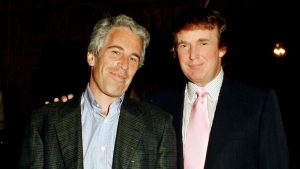The legal saga surrounding Jeffrey Epstein and his associates has become one of the most closely scrutinized criminal investigations of the past two decades. It encompasses federal and state prosecutions, civil litigation, and the scrutiny of numerous public figures who had contact with Epstein over many years. While sensational claims and political commentary often dominate headlines, the verified record provides a structured view of the events, the responses of institutions, and the broader implications for governance and accountability.
This article examines the verified aspects of the Epstein case, the prosecutions that followed, the role of federal and state authorities, and the institutional dynamics surrounding his activities, including those under the Trump administration. The focus is on documented facts, avoiding unverified allegations about private individuals or speculative political consequences.
Background: Epstein’s Criminal Record and Early Prosecution
Jeffrey Epstein, a financier with extensive social and political connections, first became the subject of public criminal scrutiny in the mid-2000s. In 2005, law enforcement in Florida began investigating allegations that Epstein sexually abused minors. These investigations culminated in a 2008 plea agreement in which Epstein pled guilty to state charges, including solicitation of prostitution involving minors.
The 2008 agreement was widely criticized for its perceived leniency. Epstein served 13 months in jail, with work-release privileges, and was required to register as a sex offender. However, federal authorities did not pursue additional charges at that time, though civil litigation and investigative reporting continued to uncover further details of his conduct.
Despite the 2008 plea deal, Epstein continued to maintain social and professional connections with high-profile individuals, including financiers, academics, and political figures. These associations have been documented through court filings, emails, and investigative journalism, providing a window into the broader networks surrounding Epstein.
Federal Prosecution and Epstein’s Arrest in 2019
The legal landscape shifted dramatically in 2019, when Epstein was federally charged with sex trafficking of minors in New York. The federal investigation included multiple victims and alleged activities spanning several years. Epstein’s arrest was carried out under the authority of the U.S. Department of Justice (DOJ), and he was held in a federal facility pending trial.
During this time, Ghislaine Maxwell, a close associate of Epstein, was also investigated for her role in facilitating the alleged abuse. Maxwell was ultimately convicted in 2021 of sex trafficking and related offenses, a milestone in the legal proceedings that reinforced the seriousness of Epstein’s operations.
Jeffrey Epstein’s arrest and pending trial took place under the Trump administration’s Department of Justice. He died by suicide in August 2019 while in federal custody, ending the possibility of a federal trial against him personally. Maxwell’s conviction later that year and into 2021 demonstrated the DOJ’s continued commitment to prosecuting those implicated in Epstein’s network.
Publicly Documented Communications and Social Networks
Court filings and public documents reveal that Epstein maintained contact with various individuals in the financial, social, and political spheres. Emails, flight logs, and civil deposition material show interactions with numerous high-profile figures. Some communications pertained to personal or professional matters, while others included social invitations or financial discussions.
These materials provide insight into the extensive nature of Epstein’s network but do not, in themselves, constitute evidence of criminal activity by the individuals contacted. Legal standards require documented participation in illegal activity, not mere association or social interaction, to establish culpability.
Political and Institutional Responses
Epstein’s activities prompted responses from multiple institutions, including federal law enforcement, state authorities, and the judiciary. Key points include:
-
Federal Prosecution:
The 2019 federal case against Epstein was pursued by prosecutors under the authority of the DOJ. The investigation focused on sex trafficking, coercion of minors, and the facilitation of illegal activity. -
Civil Litigation:
Numerous civil suits were filed against Epstein and his estate, allowing victims to seek damages for harms sustained. Civil discovery and depositions contributed to the public record of communications and interactions. -
Congressional and Media Oversight:
Media outlets and congressional committees have reviewed court filings and conducted investigative reporting to clarify the extent of Epstein’s network and identify potential legal responsibilities among associates.
The Role of the Trump Administration
Epstein’s federal arrest occurred during the tenure of President Donald Trump’s administration, specifically through the actions of the DOJ. The administration’s role was limited to the execution of federal law enforcement responsibilities, including the arrest and pretrial detention of Epstein.
While commentary often frames political dynamics or partisan implications, the verifiable record indicates that the Trump-era DOJ was responsible for prosecuting the federal offenses and continuing the investigation into individuals associated with Epstein. Maxwell’s prosecution and conviction were part of this ongoing federal effort.
Verified Documentation Versus Speculation
Numerous claims circulating in media commentary have focused on specific politicians’ alleged continued interactions with Epstein or suggest complicity in his illegal activities. It is critical to distinguish:
-
Verified communications: Certain emails and flight logs involving Epstein have been publicly disclosed in civil and criminal filings. These demonstrate social or financial contact, but do not prove criminal conduct.
-
Unverified or speculative claims: Assertions linking named politicians to ongoing illegal conduct with Epstein post-2008 plea are not publicly substantiated. No verified public record confirms wrongdoing by private individuals or political figures beyond Epstein and Maxwell.
This distinction ensures reporting adheres to factual standards, without conflating documented communications with criminal liability.
Public Interest and Political Commentary
The Epstein case continues to attract attention due to the high-profile nature of the individuals connected to him. Commentary often emphasizes political hypocrisy, influence networks, or fundraising activity, but these interpretations go beyond verified facts. While public interest in accountability is justified, it is important to maintain a distinction between:
-
Factual reporting: Court documents, DOJ filings, confirmed arrests, and prosecutions.
-
Opinion or conjecture: Claims about political malfeasance or moral judgment of individuals not legally implicated.
Responsible coverage relies on documented evidence, court records, and verified statements from law enforcement or legal proceedings.
Institutional Lessons and Implications
The Epstein and Maxwell prosecutions provide several important lessons for institutions:
-
Law Enforcement Coordination:
Federal and state agencies must communicate clearly, especially when investigating individuals with complex networks across jurisdictions. -
Civil and Criminal Oversight:
Civil litigation can uncover important evidence, complementing criminal investigation and prosecution efforts. -
Document Transparency:
Court filings, depositions, and disclosed communications contribute to accountability while respecting due process. -
Public Understanding of Legal Standards:
Association or social contact with a criminal figure does not constitute a crime. Legal responsibility requires demonstrated participation in illegal activity.
Conclusion
The Epstein prosecutions, including the arrest and death of Jeffrey Epstein and the conviction of Ghislaine Maxwell, remain significant legal and institutional milestones. They demonstrate the ability of federal authorities to investigate and prosecute complex criminal networks, even involving high-profile individuals.
While commentary and political narratives often attempt to link these events to contemporary politicians or fundraising networks, the verified public record does not substantiate claims of criminal activity beyond Epstein and Maxwell. Documented communications exist, but speculation about individuals’ culpability must be carefully distinguished from proven facts.
Ultimately, the Epstein case serves as a reminder of the importance of evidence-based reporting, rigorous legal standards, and institutional diligence. It highlights the intersecting responsibilities of federal law enforcement, the judiciary, and civil authorities in holding criminal actors accountable while safeguarding due process and the presumption of innocence.

Emily Johnson is a critically acclaimed essayist and novelist known for her thought-provoking works centered on feminism, women’s rights, and modern relationships. Born and raised in Portland, Oregon, Emily grew up with a deep love of books, often spending her afternoons at her local library. She went on to study literature and gender studies at UCLA, where she became deeply involved in activism and began publishing essays in campus journals. Her debut essay collection, Voices Unbound, struck a chord with readers nationwide for its fearless exploration of gender dynamics, identity, and the challenges faced by women in contemporary society. Emily later transitioned into fiction, writing novels that balance compelling storytelling with social commentary. Her protagonists are often strong, multidimensional women navigating love, ambition, and the struggles of everyday life, making her a favorite among readers who crave authentic, relatable narratives. Critics praise her ability to merge personal intimacy with universal themes. Off the page, Emily is an advocate for women in publishing, leading workshops that encourage young female writers to embrace their voices. She lives in Seattle with her partner and two rescue cats, where she continues to write, teach, and inspire a new generation of storytellers.









